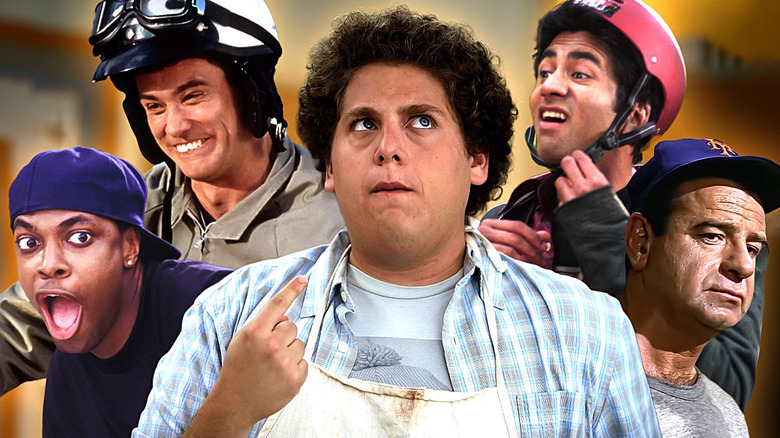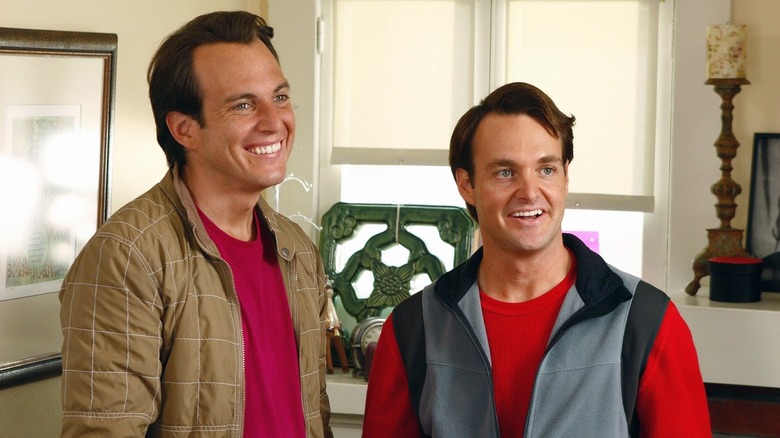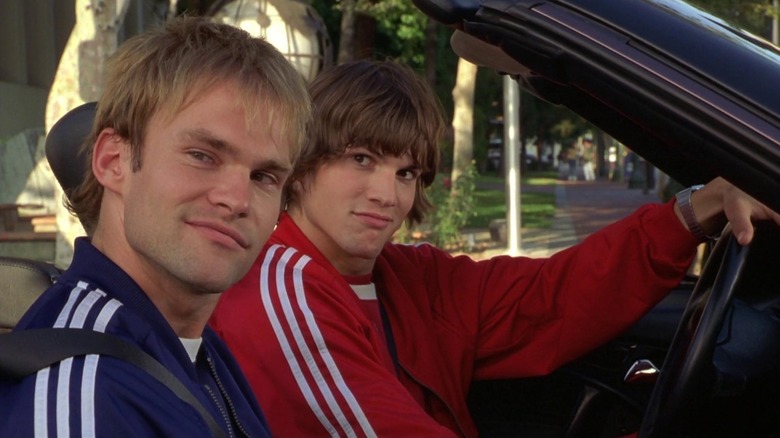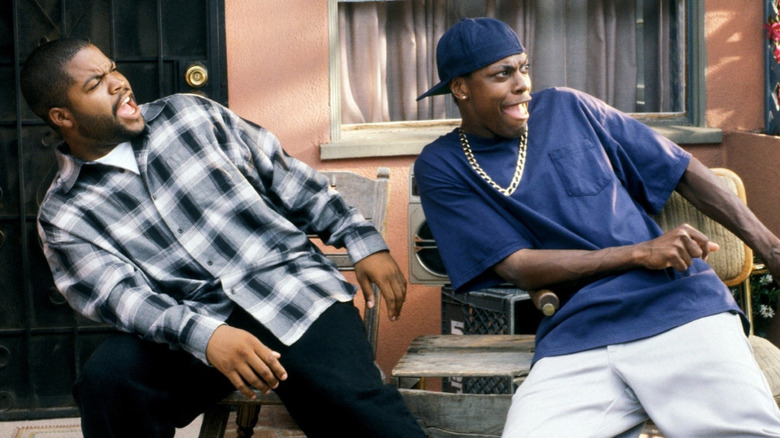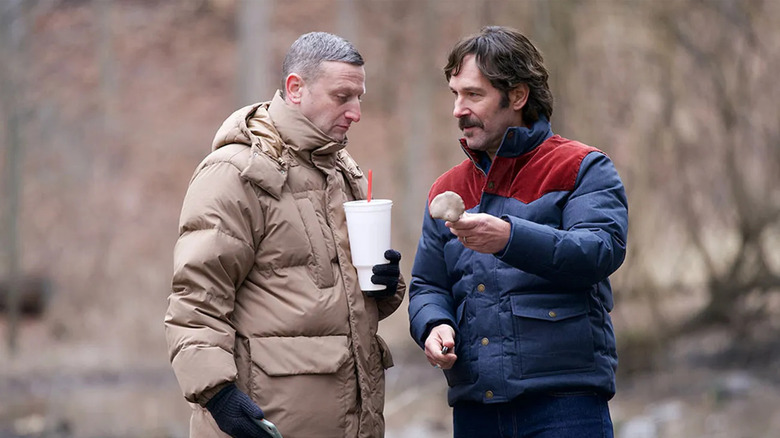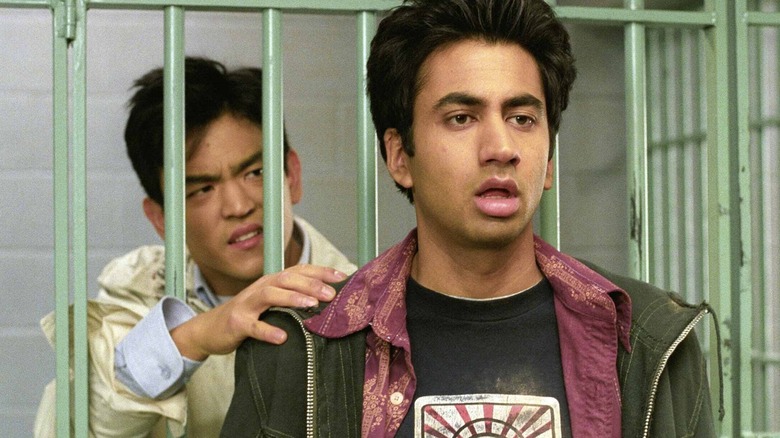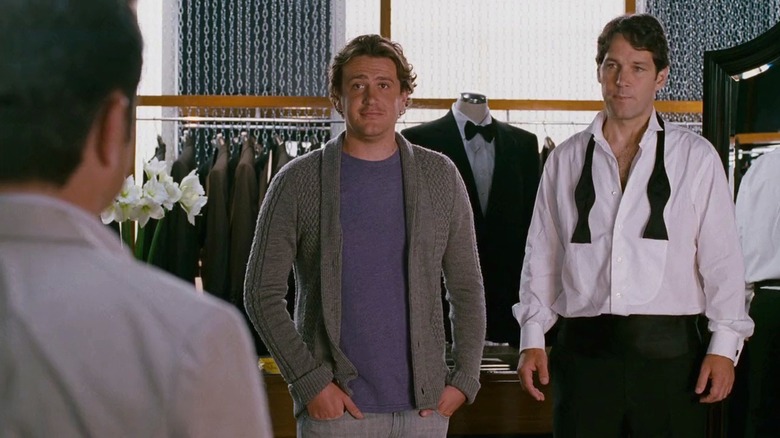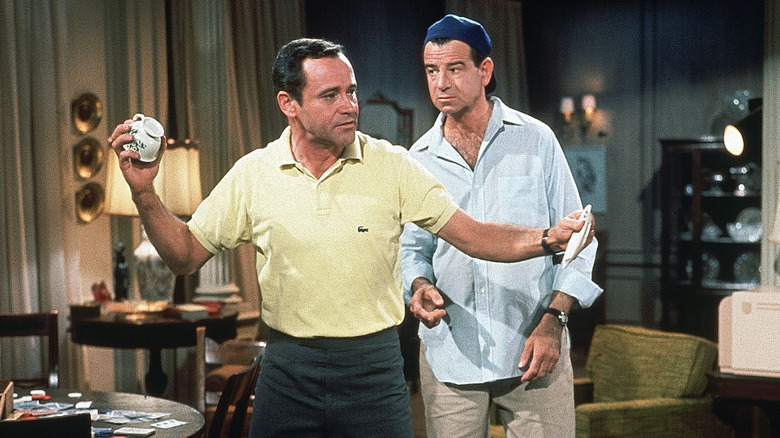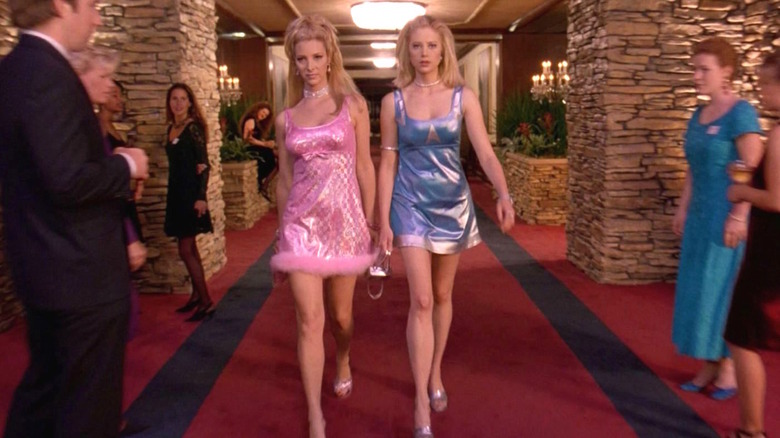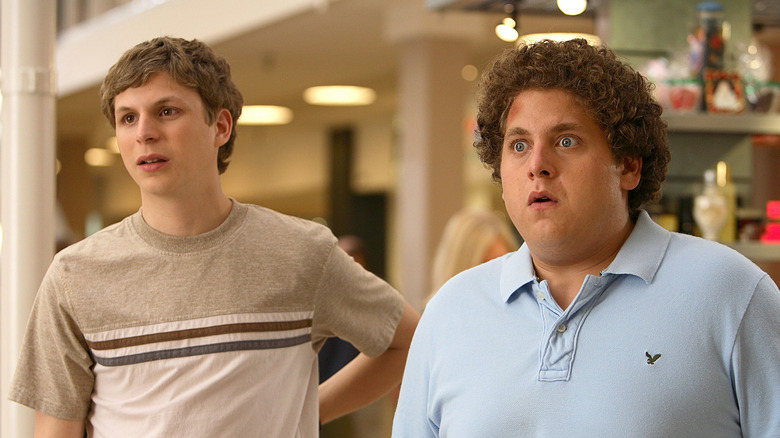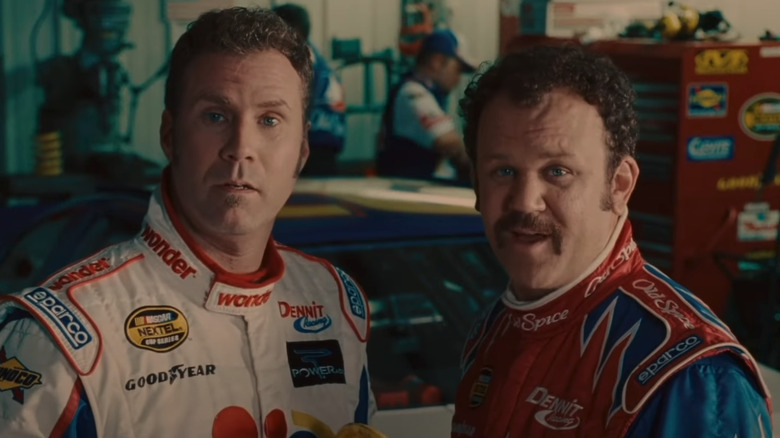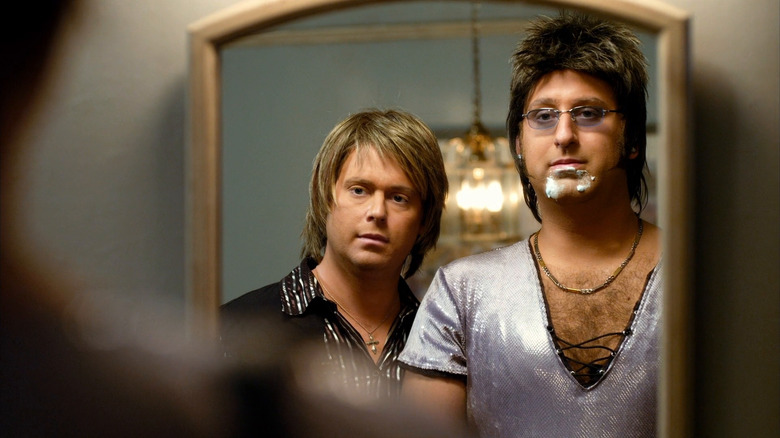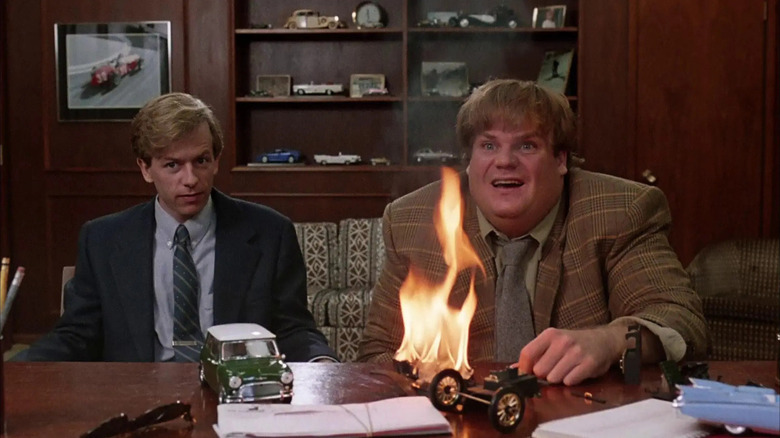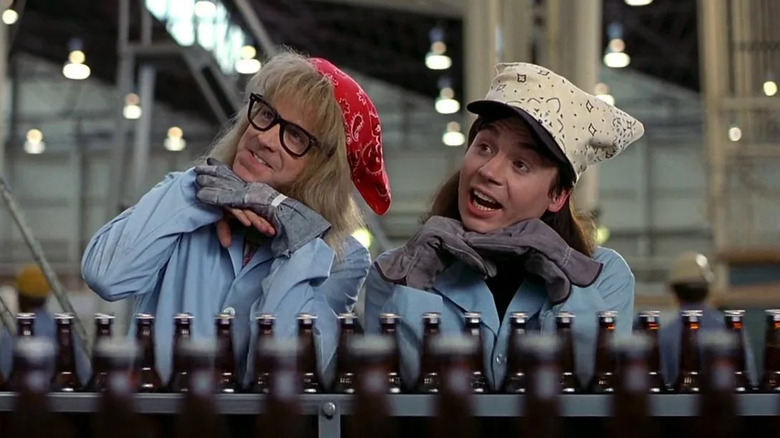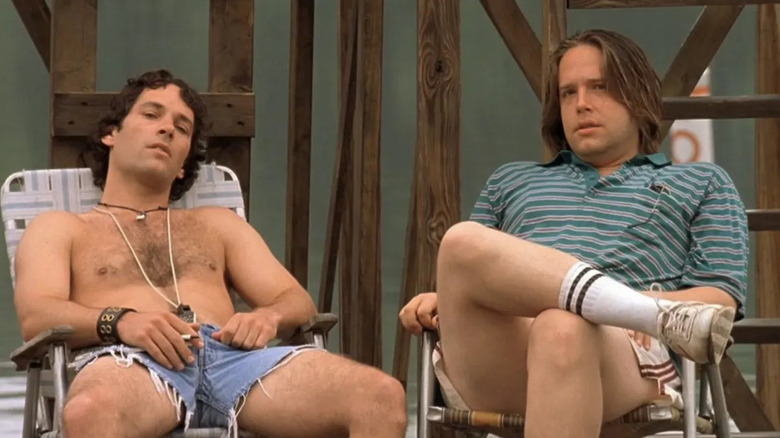15 Best Movies Like Step Brothers
If you take the time to examine every movie from "Anchorman" director Adam McKay, you'll eventually find provocative, self-serious satires of male-driven problems of power in our world, including "The Big Short" and "Vice." But years before this purposeful filmmaking shift, McKay left it all out on the field, saying everything he needed to say on the subject in the guise of a stupid, absurd, and improv-heavy buddy comedy starring Will Ferrell and John C. Reilly.
2008's "Step Brothers" is an immediate lightning bolt of laughter. It's bold, vulgar, and always chasing the most specific choice possible. It's a comedy for contemporary comedy nerds' dreams, playing with beloved concepts of sketch and improv to heighten games in ways never quite seen in studio cinema before. It's a constant barrage of body blows toward a post-George W. Bush world, reckoning with the soothsaying horrors of pre-recession capitalism and toxic masculinity before we knew how to codify those anxieties.
For those who love this flick for these reasons and more, check out the 15 best movies like "Step Brothers," and apologize to anyone you live with beforehand, because you're going to be laughing a lot.
The Brothers Solomon
This isn't on this list just because it also has the word "Brothers" in the title (though it's not not on the list because it also has the word "Brothers" in the title). "The Brothers Solomon" is an underrated piece of 2000s comedy, a sincerely absurd, aggressively stupid piece of screenwriting from Will Forte brought to bright and bold life by director Bob Odenkirk of "Better Call Saul" fame.
Forte and "Twisted Metal" star Will Arnett are the title pair of brothers on a mission to give their comatose father (Lee Majors, 'cause why not) a grandchild before he dies. As they attempt to woo women toward their righteous cause, the gags heighten and purify into heat-seeking missiles of idiocy. There is an element of satire to the picture, but it's a lot gentler and more loving; Forte and Arnett are earnest through and through, giving even the crudest jokes a strange level of emotional investment.
If you're still not convinced, check out the opening credits, set to The Flaming Lips' "The Yeah Yeah Yeah Song," and try not to laugh.
Dude, Where's My Car?
If you're writing a research paper on "incompetent masculinity as explored by 2000s comedy films" (and I hope you are), Ashton Kutcher and Seann William Scott are your primary case studies, and "Dude, Where's My Car?" is their magnum opus.
Like "Step Brothers," the film takes a central premise — two dudes can't find their car after a night of partying — and contorts it past all logic into the realm of chaos and absurdity.
Unlike "Step Brothers," which finds its unique joys with long takes of unfettered improvisation, "Dude, Where's My Car?" gets much of its nonsense from a tightly plotted but wide-reaching script from Philip Stark (who wrote for Kutcher when he was one of the central characters of "That '70s Show"). Our lovably daffy heroes meet surreal characters and uncover a borderline "Men in Black"-esque plot against the entire damn universe, all while just trying to figure out what the heck is going on. Thus, the film plays as a nice bridge between classic and contemporary cinematic comedy modes, combining the anything-for-a-joke anarchy of "Airplane!" trio Zucker-Abrahams-Zucker with the sociological man-children studies of Judd Apatow.
Dumb and Dumber
Simply, "Dumb and Dumber" is one of our great buddy comedies, an obvious template for any "two dumb-dumbs embark on a dumb adventure" comedies in its wake, "Step Brothers" most certainly included.
Jim Carrey (obviously) and Jeff Daniels (less obvious but just as sublime) are Lloyd and Harry, two best friends and absolute idiots who go on a road trip with a briefcase full of money and a heart full of love. The filmmaking Farrelly Brothers (Peter and Bobby) shove their characters through all matters of indignities, including maybe the only successful cinematic diarrhea joke, and then shove their characters on countless voices of reason to put them through the indignity ringer.
But the film, despite its title and focus, never truly punches down at its characters. Carrey and Daniels play their dumb-dumbs with a joie de vivre, a blissful ignorance, and a genuine attempt to connect with the world around them.
A final warning, though: If you've never seen "Dumb and Dumber" and choose to watch it now, it will alter your friend group's shared vocabulary. It's just too dang quotable!
Friday
Some of the best comedies have the lowest of concepts, trusting that the easy charms of their stars are the draw, not the catchy one-line elevator pitch. "Friday" is a perfect example of this tenet, giving its stars Ice Cube and a then-unknown Chris Tucker a simple world (South Central Los Angeles), a simple conflict (an upset drug dealer), and ample room to have fun. What on earth else could one need?
Cube and Tucker have crackerjack chemistry together, with Cube's scowling voice of reason playing the perfect foil to Tucker's high-pitched shenanigans. Like "Step Brothers," it's joyful to watch two fundamental comedy relationships develop and play off of each other. Depending on what's going on around them (which gets pretty damn wild, thanks to Cube and DJ Pooh's screenplay), the film either positions Cube and Tucker against each other or puts Cube and Tucker as a single unit against the unusual stimulus of their world. Either way, it will make you bowl over with belly laughs.
Friendship
If you vibe with the darker, more explicitly satirical edges of "Step Brothers," "Friendship" is an absolute must-see. It will give you that flavor baldly undiluted, using the tools of absurdity and comedic commitment not to achieve catharsis but to develop further tension. "Step Brothers" may ultimately love its male characters; "Friendship" argues that maybe every one of its male characters should literally not exist, let alone meet.
Tim Robinson, one of our contemporary kings of "loud male incompetence," plays a hapless sad sack who wants, so desperately, to be friends with Paul Rudd's comparatively alpha weatherman. And when this developing relationship fractures, things go spectacularly wrong, like a cowardly soldier dropping a hand grenade over and over.
"Friendship" is like if "Step Brothers" crossed paths with "The King of Comedy." It's not quite a sketch from Netflix's "I Think You Should Leave" stretched out to feature length, but it impressively sustains the queasy tone conveyed in classics like "Prank Show," taking down the entire concept of masculinity with it.
Harold & Kumar Go to White Castle
"Step Brothers" is a self-critical piece of work, developed by white men to punch white men in the nuts over and over again. "Harold & Kumar Go to White Castle," while written and directed by white men, positions its leads John Cho and Kal Penn as outside observers and boxers ready for their primetime fight. Boy howdy, do they land some haymakers.
There's lots of flights of fancy and pure pieces of silliness in the first "Harold & Kumar" flick, including the classic cameo from a career-revitalizing Neil Patrick Harris (he doesn't book "How I Met Your Mother" without appearing in this movie, no way no how). But "Harold & Kumar" plays the most cathartically when it gives Harold and Kumar room to demolish the racially insensitive world — including the more limited world of "how Asian men are usually portrayed in comedy films" — around them. At the peak of its powers, "Harold & Kumar" is a phenomenal high-wire work of dual achievements, the silly with the savage, the joke with the pain, the sativa with the indica.
I Love You, Man
Paul Rudd is back, and this time, he's the sad sack looking for a friend!
Playing with a welcome sense of editing crispness and screenwriting efficiency ("Step Brothers" and its Apatow/McKay contemporaries are many wonderful things, but "tight" isn't one of them), "I Love You, Man" casts Rudd as the way too nice Peter and Jason Segel as the way too bro-y Sydney and trusts them to meet in the middle as their friendship develops.
Peter is getting married to Zooey (Rashida Jones), but he simply has no male friends to be his best man; a symptom of a disease he's been ignoring for too long. So Segel is more than happy to show him the pleasures of male friendship — but will it swing the pendulum too far?
Underrated comedy filmmaker John Hamburg finds gentle pockets of the "modern American male condition" in "I Love You, Man," making it quite the effective white wine spritzer to "Step Brothers" shot of Jäger.
The Odd Couple
"Step Brothers" is a snapshot of the 2000s, preserving a very particular time and place for us to remember or reflect upon. But like any great film, its DNA comes from some classic and timeless influences, too.
"The Odd Couple" first premiered on Broadway in 1965, written by the prolific and influential comedy playwright Neil Simon. Three years later, director Gene Saks adapted it to film with the great Jack Lemmon and Walter Matthau as a neurotic neat freak and a sloppy cad who live together — and the game was changed.
While we likely remember "Step Brothers" as a tale of two ding-a-lings who love each other ("Did we just become best friends?"), the film spends a good chunk of time pitting them against each other, recalling the oil and water chemistry of Lemmon and Matthau. "The Odd Couple," thus, makes for quite the compelling counterpart, and quite the compelling collapse of "high art" and "low art."
In other words, Simon's clever pieces of wordplay and farcical feats are just as valid (and funny) as McKay's curse words and nutsack prosthetics, and it's enlightening to find the commonalities.
Romy and Michele's High School Reunion
Thus far, we've discussed masculinity at length. It makes sense; "Step Brothers" is about the peculiar prison of being a dude, and swims in the long-tested waters of dumb guy comedies.
But for those looking for some variety in their cinematic depictions of friendship and stupidity, "Romy and Michele's High School Reunion" plays like a breath of fresh air, offering diabolical levels of belly laughs with a refreshing change in point of view.
The inimitable Mira Sorvino and Lisa Kudrow play our title characters, two buffoon best friends who haven't amounted to much in life. So when they're invited to their high school reunion, they decide to lie, telling their former classmates that they actually invented the Post-it note. And you better believe that comedic sparks fly as a result!
Like "The Odd Couple," "Romy and Michele" is a movie based on a play – "Ladies Room" by Robin Schiff (who also wrote the film's screenplay). Its theatricality blends with its hard-hitting comedy bonafides splendidly, playing through the consequences of its characters' actions with uncommon investment.
Superbad
Released one year before "Step Brothers," "Superbad" was a smash success, jump-starting the film careers of all its young leads and proving the viability of the runway built by people like Apatow and Seth Rogen.
"Superbad," starring Jonah Hill and Michael Cera as fictionalized versions of the film's screenwriters, Rogen and Evan Goldberg, is obviously indebted to the classic kinds of 1970s hangout and high school movies that don't obviously interface with "Step Brothers." But it also puts into place the particular era's formula of improvisation, an odd couple friendship, and "all-or-nothing" heightening of simple situations later explored by McKay's film.
It also comes to similar thematic and emotional conclusions about the values and limitations of this particular form of male friendship, especially as it relates to growing up and existing in a more "normal" view of society. It's just particularly funny that the heroes of "Superbad" learn this lesson around age 17 and the "Step Brothers" guys are very clearly in their 40s. Maybe the "Step Brothers" guys needed a movie like "Superbad" when they were in high school.
Talladega Nights: The Ballad of Ricky Bobby
In McKay's 2006 film "Talladega Nights: The Ballad of Ricky Bobby," the director discovered two creatively inspiring collaborations: Will Ferrell and John C. Reilly, and Adam McKay and "mercilessly satirizing conservative consumerism." These relationships are perhaps more purely communicated in "Step Brothers," but it's still a delight to see them spring forth with unchecked bravado in "Talladega Nights."
Ferrell is Ricky Bobby, a hotshot, egocentric NASCAR driver, and Reilly is his partner, Cal Naughton Jr. The two "shake and bake" their way through a wholly American saga of athleticism, xenophobia, and corporate sponsorship, finding a litany of absolute banger comedy set pieces along the way (highlights include the dinner table prayer scene and the "use a knife to remove a knife" body horror freakout).
The film also represents a step toward McKay's interest in more "professional" filmmaking aesthetics, widening the 1.85:1 aspect ratio from "Anchorman" into that John Carpenter-esque scope and hiring action cinematographer vet Oliver Wood (of "Face/Off" fame, which is probably still weirder than "Talladega Nights") to lens his sequences with a surprising level of style and experimentation.
Tim and Eric's Billion Dollar Movie
The duo of Adam McKay and Will Ferrell is highly influential to 21st-century comedy. Another influential duo? Tim Heidecker and Eric Wareheim, whose bizarre but beloved series "Tim and Eric Awesome Show, Great Job!" continues to reverberate in just about every piece of filmed, short-form comedy content you see today.
In 2012's "Tim and Eric's Billion Dollar Movie," directed by and starring the duo (alongside cameos like both Ferrell and John C. Reilly), surrealism and absurdity are pushed into metatextual, abstract extremes, at times eradicating the form of the film itself in service of a particularly inspired (or anti-inspired) digression. It's like if "Step Brothers" was Xeroxed 8,000 times and shown to an alien, and then we asked that alien to helm a remake.
It's, uh, weird! It's definitely a lot less accessible than McKay's work, and you might not catch the vibes of the recommendation. But at the very least, it's a worthy study from a "history of contemporary comedy" perspective, and I'm willing to bet the Venn diagram of "McKay & Ferrell Fans" to "Tim & Eric Fans" is more or less a circle.
Tommy Boy
Will Ferrell and Adam McKay started working fruitfully together during a particularly golden age of "Saturday Night Live." A few years earlier, during another particularly golden "SNL" age, Chris Farley and David Spade found some creative mojo together and translated their appeals perfectly into the 1995 road trip comedy "Tommy Boy."
As he and Spade travel across the country to try and save Brian Dennehy's auto parts company, Farley is given ample room to "get bored" and fling himself into his typically high-energy, physically motivated spurts of chaos and vulnerability, and Spade counterattacks each one with a perfectly disseminated, sarcastic bon mot.
It's a canny understanding of how to merge dissimilar comedic energies and enjoy the tension and release that comes from the merger. And while the film starts with Farley and Spade at odds with each other (hey, just like "Step Brothers"!), their genuine, growing respect for each other gives everything a sweet and helpful grounding force.
Wayne's World
How about another "Saturday Night Live" movie masterpiece? "Wayne's World" is an actual adaptation of an "SNL" sketch starring Mike Myers and Dana Carvey as good-natured best friends and music fans who host a cable access TV show from their suburban Chicago basement. When the pair attract attention from a sleazy TV producer (Rob Lowe, perfect casting), their authentic selves are tested and brought to the brink — and that's before mentioning Tia Carrere as the lead singer/bassist of a local rock group that both Myers and Lowe wanna get with!
Myers and Carvey have predictably wonderful chemistry, finding different energies to play within the familiar trope of "burnout metalhead dumb-dumb." Notably, they're both very nice, which is a nice antidote to the generally self-absorbed and cruel characters of "Step Brothers." They support each other deeply, only antagonizing those who would get in the way of what's right in the world.
Thus, a central conflict of the film comes from two ideas on "successful masculinity" — Wayne and Garth's (Myers and Carvey's) puppy dog charms versus Benjamin Kane's (Rob Lowe's) German shepherd vision. The conclusion drawn will make any soft boy who happens to love Led Zeppelin feel much better about himself.
Wet Hot American Summer
Another influential 21st-century troupe of comedians is the David Wain ensemble, with people like Wain, Michael Showalter, Michael Ian Black, Amy Poehler, Elizabeth Banks, Paul Rudd, and Ken Marino finding comedy camaraderie in movies like "Wet Hot American Summer." Their voice is suffused with abject and utter nonsense; a vaudevillian willingness to do anything for a gag crossed with the postmodern urge to comment on how stupid they're being while doing anything for a gag.
This makes "Wet Hot American Summer," which is probably this de facto troupe's film masterpiece, an interesting and hilarious corollary viewing to "Step Brothers," not just from a historical perspective but to compare and contrast certain comedic voices' relationship with commitment. Both "Wet Hot" and "Step Brothers" are committed to their comedic choices, no matter how unhinged those choices are (and they are unhinged). But whereas "Step Brothers" wants you to invest in some level in the emotional journey of the characters, "Wet Hot" couldn't care less.
And yet, you don't feel cheated by the end of "Wet Hot American Summer," or like none of it mattered. Instead, you are awestruck by its willingness to do whatever it takes to make you laugh.
It reminds me, weirdly, of the "Harry Potter" quote: "I solemnly swear that I am up to no good." The best comedy makes this solemn oath in service of irreverence by any means necessary, and "Wet Hot" fulfills this promise and then some.
